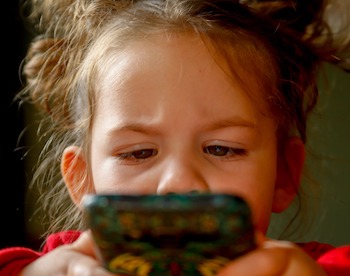Anyone who wears spectacles should make a visit to their local optician a regular thing, not just an afterthought. But for those with children, in this fast-moving digital day and age, it’s even more important to stay aware of their eye-health.
It’s a fact of life that, today, even very young children are spending increasingly longer hours in front of digital devices.
Smartphones, tablets, laptops and even electronic games make up what we’ve come to call ‘screen time’ and almost half of parents are concerned about the effect this is having on their kids’ eyes. The recent pandemic has caused an even bigger increase, creating a huge challenge for parents.
While your local optician is the best person to speak to for anything vision related (there’s nothing quite like hearing it from the horse’s mouth), understanding a little more about this topic will help you know what questions you should be asking.
Are screens harmful?
While your local optician will be able to tell you that myopia (short sightedness) is definitely on the rise, it seems that the blame can’t be placed squarely at the feet of digital devices. In fact, research has shown that there’s no evidence that excessive screen time is a risk factor and the trend was occurring even before our worldwide addiction to devices.
However, it’s not quite so cut and dried as to be able to let them off the hook. The thing is, most kids use their screens inside the house, which means less of the day spent outdoors. What researchers have determined is that, for children, the fewer hours they spend outside, the more likely they are to develop myopia. The assumption is that a brighter level of natural light is a factor and research also suggests that exercise can reduce the progression of myopia.
How should I limit my child’s screen time?
Aside from the above, spending extended periods staring at a digital screen leads to eye fatigue and sometimes discomfort. The reason for this is because our blink rate decreases when our eyes are undertaking close-up jobs like this, meaning that after a while they get tired and dried out.
All of which leads to the difficult question – just how do you manage your child’s screen time without starting World War Three? It’s quite easy really and just takes some commitment on your part to enforce and instil some simple, non-negotiable rules.
– 20/20/20: Every 20 minutes of screen, look at a point or points more than 20 metres away for a period of at least 20 seconds. This gives the eyes a break from working and a chance to rest.
– Implement strict rules around how much time children spend indoors, make sure they take plenty of breaks and get them out running around in the sunlight regularly (at least an hour a day and preferably two).
– Make sure children don’t hold their devices too close to their faces.
Ask your local optometrist
While these tips make for a good starting point, if you build a good relationship with your local optometrist he or she will be more than happy to offer individualised advice and tips on how to manage anything to do with your children’s eye health.
By David P.













